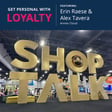Become a Creator today!Start creating today - Share your story with the world!
Start for free
00:00:00
00:00:01

The Stakeholder Game: Project Management
The Loyalty Lounge Powered by Annex Cloud Presents CX Anonymous: The Stakeholder Game: Project Management. Project management can make or break loyalty projects. VP of Project Management, Amy Forshee, ensures Annex Cloud implementations and product releases have alignment and meet deadlines. She joins us to add commentary on how we partner with our clients in their project success.
Transcript
Introduction to CX Anonymous and Hosts
00:00:05
Speaker
Welcome to CX Anonymous, the series where we provide tactical advice on successfully executing customer experience and loyalty. We don't care who you work for, just how it got done. On this series of CX Anonymous, we're continuing the discussion of the stakeholder game. This is all about getting your projects out the door. So I'm your host, Amber Collins, Product Marketing Manager here at Annex Cloud, with Scott Sherson, Product Solutions Director, and our esteemed colleague, Amy Fauci,
00:00:32
Speaker
VP of our project management office. So thanks for joining us, Amy. Please tell us a little bit about yourself. Glad to
Amy Fauci's Experience in Project Management
00:00:39
Speaker
be here. I've been in the project management field for over 20 years now. Most of it has been in the software development industry.
00:00:46
Speaker
Key areas of focus have been managing cross-functional teams and basically whatever it takes to bring products to market, as well as supporting the customer journey and all of the processes related to that. At the beginning of this year, I was brought into Annex Cloud to establish a project management office.
00:01:05
Speaker
And the primary goal is to develop best practices and processes to make sure that we are delivering value to our customers throughout that journey. My team currently includes projects and implementation managers who are responsible for getting our customers live before we turn them over to customer success to live throughout their journey.
00:01:28
Speaker
an extremely important role, especially when we talk about a loyalty initiative that can be so complex and so ingrained into the rest of the organization. So we're super happy to have you on board.
Challenges in Implementing Loyalty Programs
00:01:40
Speaker
So of course, this season's topic, managing stakeholders, we all know it's a science, it's an art, probably something very close to your heart, Amy, considering all that you have to get done. And so you've brought in so many loyalty initiatives to life for our clients.
00:01:54
Speaker
and you assist in creating process in order for our own internal initiatives. So I'd like to open up our discussion with a few questions specifically about implementing loyalty programs. So no names, no blames, this is the ex-anonymous. But what is the number one reason why you see teams having a hard time implementing projects that could be org-wide like loyalty?
00:02:18
Speaker
I think it's, you know, it applies to all projects really in general. I think the biggest reason is misalignment among the team, and that could be due to conflicting or differing goals. As typical, like I said, with any project, internal teams have their own objectives of what they're trying to accomplish, right?
00:02:38
Speaker
For example, sales and marketing, what's a product that's easy to sell with clear messaging and a value prop, right? Product management wants feedback from customers on what problems they need to solve. And so they know what to build and how to build a roadmap. Development is focused on how to solve the what and the why that product management has described and the CFO and CEO want to be profitable, right? And so each of these teams is going to approach the project from what they want to accomplish.
00:03:07
Speaker
And it's important for the entire team to have a collective view of those goals and to understand where everyone is coming from. Absolutely.
Strategies for Project Success
00:03:17
Speaker
Scott, how have you seen teams struggle in implementing, especially now everything is tech, but especially tech-heavy projects? I mean, similar to what Amy was saying, everybody's got a conflicting problem. One of our earlier things was about aligning everybody's pain.
00:03:38
Speaker
And I think that where projects tend to go off is we might have aligned a pain or tried to solve the pain at the beginning, but then we don't keep looking back like what else is coming up, what else is changing, what conflicts are new to the organization. A lot of times the struggle projects are the ones that just
00:03:59
Speaker
You know treated as a one-time event and then now everybody you know has a you know smooth sailing, lean slate, everybody's ready to go and all aligned on the same page. No, life changes, life evolves, people change, people evolve, other things come up, things break, there are different things that have to happen. So I think that real, that continual realignment
00:04:21
Speaker
where a lot of projects start to get off and kilter. I agree. So then what would make a team more prepared than the average team? How can teams go into this and really knock it out the park? A couple of things, you know, it's obviously important to understand everyone's perspective and having open and transparent conversations around expectations is really key to success.
00:04:47
Speaker
If the team is not aligned on the expectations, then assumptions are made and that can lead to misunderstanding conflict. I like to make sure that everything is clearly documented and agreed upon by all stakeholders to avoid that. Writing things down seems pretty basic, but it goes a long way to remove the ambiguity from what someone thought they heard.
00:05:10
Speaker
And then, you know, just in general at annex cloud, we, we are implementation expert, right? We've done this time and time again, and we get better every time, right? We're learning from the lessons like to stop point earlier, you know, those pain point to, to make that process better. We're applying those lessons learned. So then how do you take some of those lessons learned and break implementation manager out of that, um,
00:05:34
Speaker
a director of timeline mentality because everybody's kind of building, everybody's kind of doing. So a lot of organizations just look at a PMO or an implementation manager as just a person who is the keeper of the timeline. Have you done your jobs? When are you going to do your jobs? Have you done your job? When are you going to do your job? Beyond those like two questions, how do you keep people on track?
00:05:57
Speaker
I mean, the customers and files are in the data crop. All of the above. Remember, it's all of the stakeholders because, again, the PMO is really that needle at the top, that person at the top who's kind of, you know, directing everybody with the little strings and all of that. A loyalty project has a lot of stakeholders with it, and it can be a business transformation rather than just the setting up of a new software, right? So as a project manager,
00:06:26
Speaker
you are more than just a task master. As a project manager, how do you break the team out of the mold of we show up, we keep to a timeline and we ask two questions. Did you do your job? When are you going to do your job? I think it's important for a project manager to be well-rounded, right? It's not just managing tasks. It is about building relationships. It is about listening to all stakeholders in the project.
00:06:57
Speaker
It is about providing visibility to everyone from our side on the annex cloud leadership team to all of the customer stakeholders into progress potential risks that might impact a project, etc. Right. So
00:07:12
Speaker
Our project managers within Annex Cloud have that larger role of building those relationships, making sure they are providing visibility into anything that may derail a project, right? Active risk management, whether that be providing that detailed project plan in monday.com with visibility to all those stakeholders, like I said, or back to the documentation point, making sure
00:07:40
Speaker
that requirements are clearly documented. Our risk register is up to date. Our project meeting minutes are published, right? Just again, removing that ambiguity from the project in general. So what I'm hearing is that it's not a one-time event to say, are we all aligned? It's an evolution. It's difficult, but that's where Season PM comes into play. It's somebody that
00:08:09
Speaker
that has the experience with the suck. Where do you see the loyalty of a project manager or just an industry-wide project manager?
00:08:17
Speaker
Do you find people who are like, I went to college for this, or do you find people who have just been as a part of a lot of really cruddy things and then get really good at solving problems? Yeah, it's interesting because when I'm hiring for new project managers, I don't necessarily look for somebody in the industry, although that is a super added bonus.
00:08:39
Speaker
I am looking for the foundations of being able to be obviously manager project, but that relationship building piece, I mean, when you think about our typical implementation timeline is four to six months long.
00:08:55
Speaker
That's a long time you're going to be working with a project team, right? And it's not just doing a flyby of, you know, to your point earlier, Scott, like check off the tasks as they're done. It's building that relationship, building the trust and the respect among the team. And I look for a lot of those kinds of qualities when I'm hiring for project managers, as well as other roles in my team, right? I want to make sure that.
00:09:21
Speaker
The project managers are approachable. They're trustworthy. They have respect for everyone. Just being able to manage, again, ambiguity, risks, et cetera. So it is, it is truly not just project management skills, but really well-rounded person. So then let's take something that you mentioned briefly with monday.com.
Transition to Monday.com for Project Management
00:09:43
Speaker
PMs back in the day, they use Excel and they use Word to track like everything. What is a tool like Monday.com give a PM or somebody who's managing the project? What does it give you to differentiate and help with that overall process? Why choose a Monday.com instead of just Excel? Well, so the problem that we were running into with Excels and Word documents were we didn't really have a way to manage a standard project plan.
00:10:12
Speaker
Right. We started with an Excel and everybody basically customized to the way they wanted it or where the customer wanted it. Right. So there was no consistency across the team. And when somebody, you know, at my level coming along to go check the project plan, I don't know where to look because it's not in the same place for every customer. Right.
00:10:32
Speaker
And the problem with that also is you're having to share it either packing a back and forth via email, right? So you have copies that are not, you know, multiple copies. You're not working out the single source of truth. It introduces a lot of confusion. There's just not a lot of consistency there. So with implementing Monday.com,
00:10:53
Speaker
It is that single source of truth. We start with a standard template for every customer that gets customized based on varying requirements with the customer. And then, like I said, everybody has visibility into it, right? And it's cloud side as well as the customer side. And the customer is able to go in and update their action items, right? And it's all real-time accessible via web.
00:11:21
Speaker
What is the maybe the benefit of like a Monday versus like ServiceNow Kanban board or something like that?
00:11:27
Speaker
Where do you find it's easier to share? Where do you find it's easier to keep people on track? Again, we're not selling tools that we don't sell, but we're- We're gonna need Monday.com to sponsor this. You can see the rolling pally of tips that they're providing us. But there are a lot of tools out there that say we are the best, but what I wanna try and focus on is solving a problem, and that problem is keeping everybody onto organization.
00:11:55
Speaker
with two completely different tech stacks and two completely different project management organizations on the same track. So in CX Anonymous, we have initially focused on solving that customer problem and getting everybody there to align. But with you here, I feel like we have a unique opportunity to say now we have two different organizations that we are trying to combine with unique needs and unique goals and unique challenges.
00:12:21
Speaker
And I feel like the tool that you've selected allows us to do that. And where are some of the benefits of that tool in terms of sharing versus other tools like a shareable Canvan board or Trello or something like that. In evaluating Monday.com, it was
00:12:39
Speaker
very short time to learn, right? So for people who have not used a tool like this before, it's a very short learning curve, right? It's very user intuitive. So I think that was a goal as well as, like you said, providing the visibility to external customers, not requiring a software license, right? We don't have to pay for that. The external client being able to actually edit, also the security of it, right?
00:13:09
Speaker
the customer can only view what we share with them. So all of our customers' data is segmented from each other. So I think those were probably the key areas that we were looking for in selecting Monday.com and it's a true project management tool.
00:13:26
Speaker
It allows us to create dashboards internally from separate customer boards. So we have that visibility at a leadership level, implementation timeline, what's overlapping for customers, where we may have some resource contention. So internal planning is really helped using the Monday.com tool.
00:13:46
Speaker
And it's really easy to generate Gantt chart, all kinds of different tools, visibility, could stick into a PowerPoint or whatever the need may be, right? So I think I've not had a lot of experience with any user service now. I mean, obviously we use Jira and Kanban board. I think just, you know, the whole package of Monday.com, those were the positive key things that we were looking for.
00:14:11
Speaker
as an organization though. Awesome. Well, I as the product marketing manager also use the boards that are created for our implementation or rather our product management and product releases. Aside from those tools, which we use daily, that was my point. How else are we a partner in our customers preparedness for these large projects?
Importance of Team and Customer Alignment
00:14:34
Speaker
We've created this process and it's for the better of everybody.
00:14:37
Speaker
And so talk to me a little bit about how our team goes to that process, how we've structured our team so that we are positioning ourselves as the best partner for them. Well, one of the significant changes we made was bringing in project management into the implementation process, right?
00:14:55
Speaker
So every implementation has an assigned project manager who will stay with that customer through the entire journey. That is a single point of contact for the customer. If something arises that the customer doesn't know who to go to, it's always the project manager. They can track it down, right?
00:15:12
Speaker
And my team is responsible for helping solution the customer strategy, right, based on their requirements. And so, you know, more to the tools in the process, we produce a statement of work to outline the agreed upon deliverables, right? We put a lot of effort into making sure that program requirements are documented timelines. You know, we have a RACI chart, so everybody knows who's responsible for what.
00:15:37
Speaker
and making sure we know what is out of scope as well, right? We're trying to set everyone up for success by setting the expectations at the beginning of the project and making sure they're clearly documented with that statement of work. After that, when we go into more of our discovery phase, we use gap analysis to understand where, you know, we might need a different solution or an enhancement in our product to fulfill a requirement.
00:16:03
Speaker
or a different plan altogether, right? Do we need to bring in a partner to solve a use case or whatever the case may be?
00:16:11
Speaker
And then again, the detailed project plan in Monday.com. So they, everyone knows exactly where we are in the process. So let me ask the question about you're bringing on a new customer. How often think a customer is coming on and they have not aligned all of what the project is all about. Like what are we trying to do here? Percentage eight out of 10, five out of 10. That's, I'm going to go with, from my experience in the last 10 months that I've been here.
00:16:39
Speaker
Um, I would say five, five out of 10. So if I can kind of play that back, half of the customers coming on board have not aligned internal teams using that number about how long would you say?
00:16:53
Speaker
could save as an organization coming in. They could save by pre-aligning. Like I said, our standard implementation is probably four to six months. And I would say making sure that everyone is aligned would save us a good month out of that schedule. Yeah. 25 business days could potentially be saved by pre-alignment. And time is money. We all know that.
00:17:19
Speaker
So with that, I would love to wrap up our conversation as we always do with the top takeaways. And so Amy, you said something that you didn't say this verbatim, but what I got from it is that
00:17:34
Speaker
the vendor's process or lack of can also dramatically affect a customer's success.
Impact of Vendor Processes on Project Success
00:17:42
Speaker
So our process can affect a brand's success or time to value or the success of the implementation. And so I would say that then for me, especially since you said that half of the teams that you've seen have not quite been aligned, that not only do we need to think about alignment on
00:18:02
Speaker
All sides, but ask about the process, ask about the process and make sure that your team understands it. Is aligned with that as well. Because with the, with the wrong vendor, with the, you know, with the wrong process, it's going to turn something that you thought was going to be successful project that was career defining or just something that you, this vision that you had to get off the ground, it can drastically affect it. How, how well the vendor or the partner on the other side processes things.
00:18:33
Speaker
Absolutely. I think that's my greatest takeaway from that. Working directly with you here at Annex Cloud, I'll say that I think we have a great process. I think that we truly are invested in our customer success and we've taken the time to think deeply about that. How about you, Scott? One month.
00:18:55
Speaker
You know, we've talked about this with a number of our other guests, you know, the importance of alignment and you know what it can do for you. But I think Amy is the first one to really like quantify that and say,
00:19:07
Speaker
that by not doing that, you have wasted a month. And it's about half the project. Exactly. So let's say you did it for half the projects internally as an organization. Those are, those are numbers that affect the people above you. Those are numbers that affect the people below. Those are the numbers that have conversations that you don't want to have. So Amy.
Building Trust Through Communication
00:19:27
Speaker
So my, my last Prince of Wisdom, I think communication is key, right? It is the foundation for building relationships and trust.
00:19:37
Speaker
It helps for conflict resolution. And if you have open and transparent communication, it's going to set the team up for success. And it's going to make a positive project experience all around. And, you know, building relationships is what loyalty programs are all about. Exactly.
00:19:55
Speaker
So that's why we're all here, right? It's to build those relationships. So if you would like to get a solution built out for you by Scott and implemented by Amy's team, you need to go to annexcloud.com and book a demo request or grab one of our AEs off of LinkedIn. But this has been another episode of CX Anonymous. Amy, thank you so much for joining us today. And we are almost to the end of our stakeholder season and we cannot wait to share what we have in store for the next season.
00:20:24
Speaker
It's my pleasure, thank you.



















